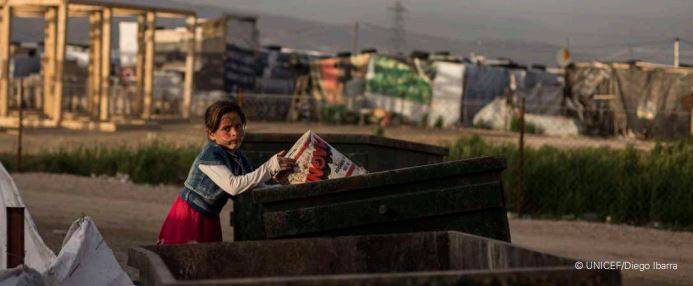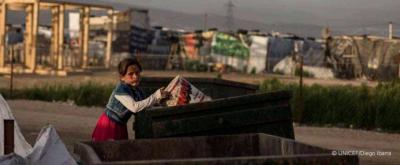UNICEF's office in Beirut has reported that 3 in 10 children go to bed hungry or skip meals. The report states: "The accumulated and intertwined crises in Lebanon have pushed many families to struggle for survival, with more than half the population now living below the poverty line. Some have described the current conditions as worse even than during the civil war from 1975 to 1990, attributing this to a series of crises ranging from economic collapse to the COVID-19 pandemic, and the Beirut explosions in August 2020, along with ongoing instability.
The "Hesba" camp, located in southern Lebanon, is situated at the base of a bridge alongside a busy highway, branching off into four towns. This camp has housed over twenty Lebanese families of Palestinian origin for the past three decades. Hamad, 30, has lived in the camp since he was a child. He says, “Life has not been easy at all. Every penny we earn is spent on basic necessities such as food, clothing, rent, and medicine. We long ago forgot about luxuries. Unfortunately, we don’t even have money for necessities. Here, in Hesba, the alleys are narrow, and it is noticeable that the camp is free of the garbage that often piles up outside. The reason is that residents consume very little; the less consumption, the less garbage. Additionally, some camp residents gather anything of value from the trash, like glass, aluminum, and packaging paper, and resell it. Plastic bags are reused.
Every day before noon, Hamad searches for scrap in the garbage along the roads, hoping to find something to resell to earn a small income for his family's needs. He seeks ways to survive as prices continue to rise—many food items have tripled in price over the past year—while wages remain stagnant and do not keep pace with rising prices. Hamad earns about 150,000 Lebanese lira weekly (equivalent to about 10 US dollars at the current black market exchange rate), and he spends most of his earnings on food. He shares with a smile, “We haven’t seen even one piece of meat in five months. Securing medicine is nearly impossible as well. When we face an emergency, I look for extra work. I don’t know what will happen to my family if I fall ill.”
He gestures towards his 11-year-old son Ammar, saying, “He is still young and doesn’t have the strength to join the workforce,” and adds, “It won’t be long before he has to enter the fray of life and start earning some money like I do.” According to Hamad, education is not a priority for the family. At least for now, schooling is not a priority for the residents of Hesba. The most important thing for them is ensuring survival.
In a rapid assessment conducted by UNICEF in April 2021, it was found that boys, girls, and their families face multiple vulnerabilities due to the ongoing economic crisis. The survey indicated that 10 percent of children have started working in some form of paid labor—22 percent of Syrian refugee children, 7 percent of Palestinian children, and 4 percent of Lebanese children. The survey also showed that three in ten families have at least one child who went to bed without dinner or skipped at least one of the three meals. It also indicated that all families are suffering from rising food prices.
Shadi, one of Hamad’s neighbors, also has his struggles and states: “Our lives have become extremely difficult. We rarely eat until we’re full.” Shadi lost his job in the vegetable market last year and explains, “When vegetable prices skyrocketed, it became difficult for many people like me to buy vegetables and fruit.” He is now trying to seize any job opportunity he can, no matter how small, to continue surviving and says, “I live off whatever is in my pocket,” which is very little these days. Shadi earns about 10,000 Lebanese lira daily (equivalent to 0.66 US dollars according to today’s black market exchange rate) and with this meager amount, he attempts to provide food, shelter, and clothing for his nine children. He is still somewhat able to buy food, or let's say some types of food, and he says, “We eat lentils, rice, and some vegetables. Here in Hesba, people are used to helping each other—this is all we can do; we have no choice but to wait.”
Zainab, 16, is seen leaning against a doorframe. She used to go to school before the COVID-19 pandemic, and today, after some restrictions have been eased, she hopes to return once life returns to normal. Her father does not appear very optimistic and says, “Who will be able to pay for the bus fare to take my daughter to school or the taxi fare for her to get there? I can’t afford that anymore.” Zainab hasn’t left Hesba for months and hasn’t even crossed the nearby bridge, saying, “Where can I go without money? As long as this is my situation, why should I even think about what won’t happen?”




